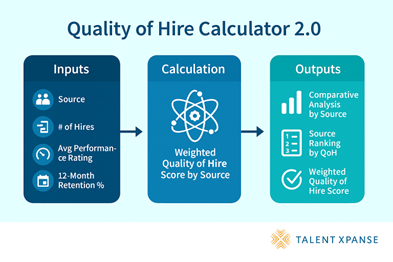Precision in Talent Acquisition, Part II: Establishing Quality of Hire Criteria in Your Environment
Precision in Talent Acquisition, Part II: Establishing Quality of Hire Criteria in Your Environment
By Tremaine Friend, PHR, SHRMCP

From Concept to Practice
In our last installment, we reconnected with Quality of Hire (QoH) as the metric and lens through which we can measure the success, quality, and value of the tools within the talent acquisition and recruiting function. As we continue forward in our learning journey around QoH, we move from foundational knowledge into practical application and operational execution.
✨This is where theory transforms into action and where talent leaders can begin to redefine what hiring success really means.
Defining QoH means designing a framework that reflects your organization’s unique definition of value. That’s more than tracking retention or performance in isolation it’s about combining the right metrics into a model you can measure, repeat, and present with confidence.
Now imagine being able to sit down with your CEO or CFO and show, with data, exactly how much value your hires delivered in their first 6 to 12 months. Our intent is to empower HR and recruiting leaders with both a comprehensive methodology and a realtime application to navigate these conversations with clarity and confidence.
Developing Your Strategic QoH Criteria
Every organization wants to hire effectively and maximize the performance of its recruiting tools. Yet, “quality” looks different across environments. QoH criteria vary depending on tangible and intangible aspects from corporate climate to industry to business model.
Without agreed upon criteria to support talent acquisition and recruiting strategy, QoH can become subjective leaving HR leaders vulnerable to misaligned measurements, unclear value.
✨ Strategic QoH criteria matter because they create alignment. They connect workforce skills, projected performance, and company goals into one cohesive story.
When defined correctly, they become the barometer of success giving talent leaders a language to explain ROI in terms executives understand: performance, retention, and productivity.
The Real Challenge: Operationalizing QoH
The real challenge isn’t defining QoH it’s ensuring that QoH is consistently adopted and operationalized. Many HR and talent leaders agree that measuring performance, retention, and productivity is critical. But most organizations stall when it comes to turning those ideas into a process that’s consistent, scalable, and credible in front of executives.
Operationalizing QoH requires three commitments:
- Consistency. Track metrics the same way across roles and managers.
- Comparability. Put results side by side by source, by department, by role so patterns emerge.
- Communication. Build the ability to tell a story with the data: how talent acquisition is driving ROI, productivity, and retention.
As a first-level demonstration, the QoH Calculator 2.0 provides a sandbox to quickly measure the performance of your talent and recruiting tools, showing how QoH can be applied in real time.
A Framework for Operationalizing QoH in Your Environment
- Start Small. Pilot QoH in one department or hiring cohort.
- Centralize Data. Bring performance, retention, onboarding, and source data into one place.
- Apply Weights. Prioritize what matters most (e.g., Performance %, Retention %, Productivity %).
- Score & Compare. Generate QoH scores for each source or department.
- Report & Review. Share results with leadership, tying outcomes directly to sourcing strategies.
- Iterate & Expand. Refine weights, expand to more teams, and embed into quarterly reviews.
Where the QoH Calculator 2.0 Fits
This is where most organizations hit a wall: spreadsheets get messy, reporting becomes inconsistent, and leadership loses confidence in the data. QoH Calculator 2.0 eliminates that gap.
- Inputs: Performance ratings, retention %, time-to-productivity, number of hires, source.
- Outputs: Weighted QoH score, side-by-side source comparison, visual scoreboard.
- Customization: Adjustable weights so the framework aligns with your organization’s priorities.

✨ This smarter, sharper version of our tool takes the mystery out of QoH. It transforms scattered data into a structured, repeatable process.
It allows you to compare sourcing channels, adjust for your business priorities, and build dashboards that elevate talent acquisition as a strategic partner.
On October 16, 2025, we will be training and educating HR and recruiting leaders on the full usage of QoH Calculator 2.0. Whether you join our live webinar or book a oneonone sourcing audit, you’ll walk away with access to the tool and the practical knowhow to lead with Quality of Hire.
Beyond the Numbers: Building QoH into Strategy
The ultimate goal is not just to measure QoH once, but to embed it into your ongoing strategy:
- Make it part of talent acquisition and recruitment scorecards.
- Use it in sourcing reviews.
- Include it in vendor evaluations.
- Report it alongside revenue and productivity in executive dashboards.
✨ When embedded into strategy, QoH shifts recruiting from being viewed as a cost center to being recognized as a driver of lasting value.
Final Thought
Defining QoH sets the stage. Operationalizing it makes it real. And with the right tool, it becomes repeatable, credible, and actionable.

